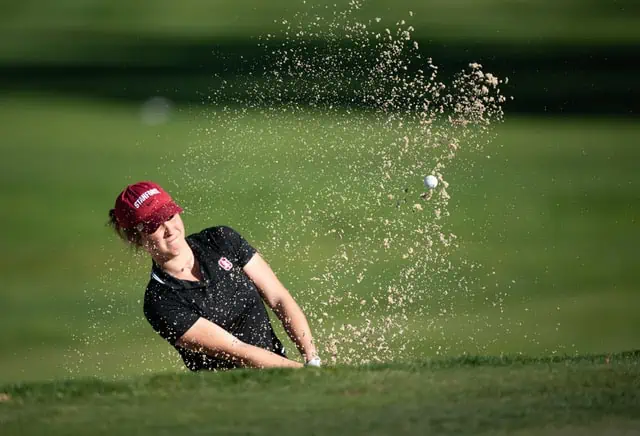EcoAthletes golfer Rebecca Becht: “I am definitely the exotic one”
Belgian Rebecca Becht plays for the Belgian national team and studies at Stanford University in the USA. She is one of three golfers who are EcoAthletes. EcoAthletes is an American non-profit organization founded in 2020 by Lew Blaustein with the goal of raising awareness among athletes about the explosive nature of climate change. In total, 111 EcoAthletes Champions with a combined 1.6 million social media followers have gathered under the organization’s umbrella. Golfers, however, there are only three.
What attracted you to the EcoAthletes?
I thought it was totally cool from the beginning. There are workshops every month, for example on sustainable fashion. This is a really important issue for us athletes because we get so many duds. There are also community chats every month where we talk about sustainability or where experts provide information on a topic. There are quite a lot of athletes from different age groups, some are professionals, some are not. All have different backgrounds and different experiences.
Are athletes from sports that are particularly affected by climate change more engaged?
There are a lot of winter sports enthusiasts at EcoAthletes, but that makes sense because they are of course strongly involved in the topic.
Where do you notice that golf is affected by climate change?
We have these extremely strong fires here in California, and also at the beginning of the year the rain was so heavy that we couldn’t play golf at all. The effects of climate change are not as severe as in winter sports, but we notice it too.
Are you studying a subject at Stanford that falls into sustainability?
Yes, it’s called Earth Systems. I’m on the human environmental systems track. So we look at sustainability from the human side, political, economic, social. At Stanford, my program is part of the Doerr School of Sustainability. Next year, I’m applying to the Honor’s Program as part of my Earth System major, and then I can spend a year doing research for a sustainability project.
However, I have to say that it is difficult to implement sustainability projects while still studying. I would like to do more, but I have to combine it with golf and studying. This is difficult. That’s why I try to make a difference in all the little things I do in life. That’s the good thing about EcoAthletes. The program is made for athletes who have little time and are often stressed, but want to continuously contribute to the fight for sustainability.
How is your commitment received by your teammates?
I’m definitely the exotic one, which is very frustrating at times. When lights are just left on or it’s not recycled, it frustrates me. I then try to give little hints, but it’s not always easy. On the other hand, of course, you can make a big difference and make a difference. However, it has to be said that California in general already takes the issue of sustainability seriously, and so does Stanford.
So is the sustainability approach reflected when the Stanford golf team goes on tournament trips?
Yes I think so. For example, we all have refillable bottles. Instead of mini packs of trail mix, we buy the really big boxes and then repackage into small containers. Stanford’s driving range also has recycling bins. The whole thing is not as important for all the players in the team as it is for me, and I sometimes get on the others’ nerves, but overall they accept it and make an effort.
The mobility issue in the Gulf is the most difficult point. How do you travel as a team and discuss the issues?
There is no direct discussion. Basically, we play a lot in California and we always go there by car. When we fly, we fly economy as normal.
Have you played professional tournaments? And did you get the impression that the sustainability issue was present among the proettes?
In Europe, I played a few LET Access tournaments and yes, I have the impression that the topic has become much more important throughout the golf world. The R&A also thinks this is totally important and is very involved in this topic.
Which topic is the most difficult for you personally to implement?
I generally find it difficult to tell other people nicely and respectfully that there are other options. I had to learn that when I arrived in America. Of course, no one likes to be told that they are doing something “wrong.” I learned how to communicate the urgency of the issue to people without appearing condescending or forcing things on anyone. I don’t want to tell anyone how to do anything, but want to be helpful if someone is trying to find more sustainable lifestyle options.
Do people feel caught out?
Yes, that’s true. For example, I can’t just say, “In Europe, people are already doing that; why can’t you do that here? This hurts the person being addressed. I still have to learn and adapt to each person. I learn something new every day.








